Displaced & Rejected: The Pains Of IDPs With Disabilities In Benue IDP Camp
Neglected by the state authorities, many IDPs with disabilities in the northcentral Nigerian state narrate tales of bitter survival.
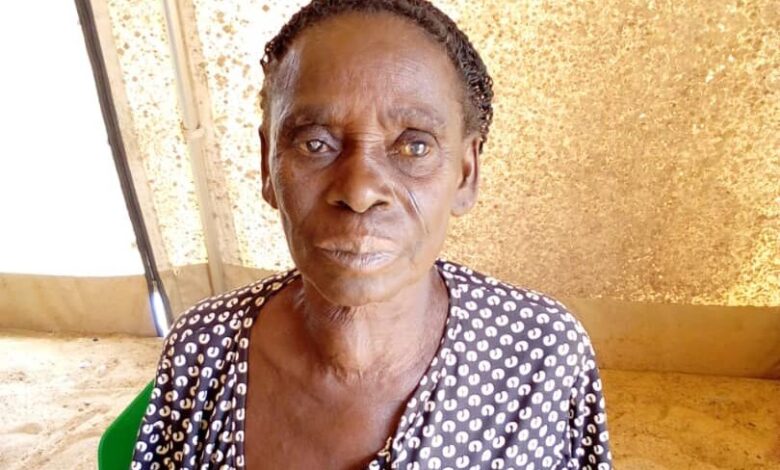
Fidela Anhwer, 60, is one of the physically challenged internally displaced persons at Nepal Quarters Camp, located in Makurdi, Northcentral Nigeria. She was shaking vigorously, trying to locate her walking stick when our reporter visited the camp.
Anhwer clenched the stick as she took one step after the other. Her aim was to get to the Christian aid organisation that was sharing clothing items and provisions at the camp.
She wouldn’t have faced a lot of difficulty if her 13-year-old daughter, Alice, was around. But the young girl had already hit the streets to get some money, having endured persistent hunger for days.
“She is begging so we can eat,” Anhwer said. Though born blind, life was much easier for her at Umenge village in the Guma Local Government Area (LGA) of Benue before she became displaced following repeated crises between crop farmers and cattle herders in 2018.
“People had food and it was easy for them to share but the IDP camp is a no man’s village. I can’t blame others because they also don’t have enough for their family.”
Anhwer is not the only blind individual in the camp. Barnabas Ajir, who was also displaced from Guma LGA, said he has been blind since he was an infant. He believed that his predicament was spiritual so he didn’t bother to seek medical care.
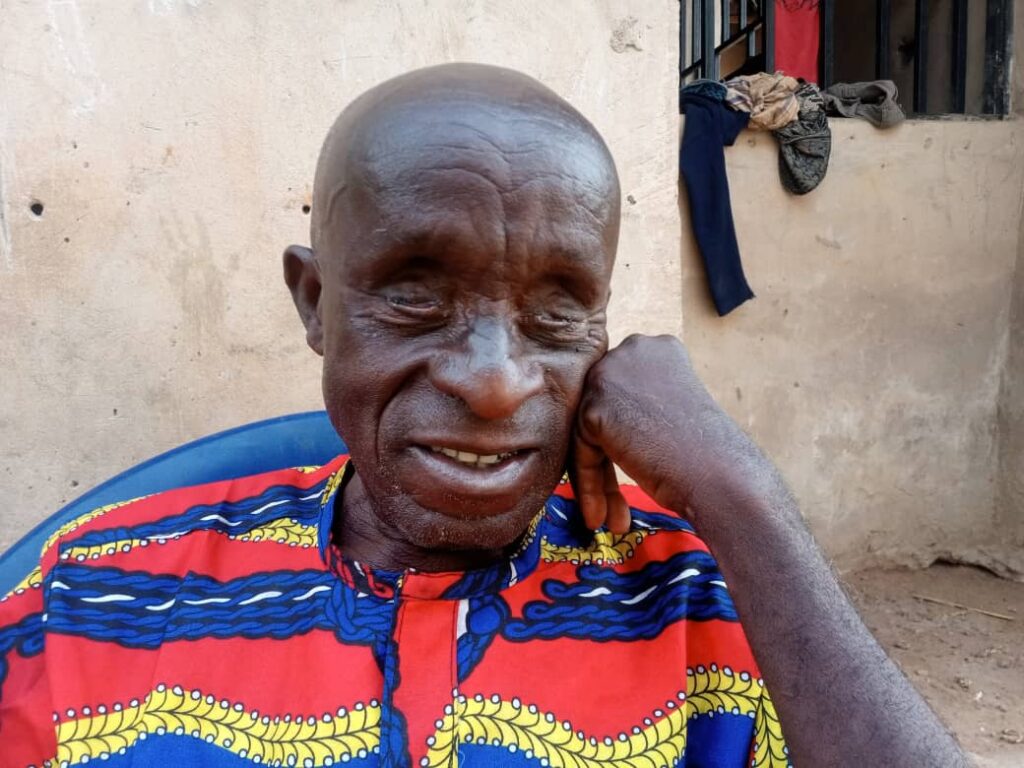
“My mother told me they did local herbs and other medication when I was small but it didn’t go so they left me like this. My only wish is to have a wife who will take care of me because my blindness has not permitted me to marry all these years.”
He does not believe that help would come to them at the IDP camp since they are all neglected by authorities.
Disabled children at the camp
Amid heightened hunger, Eucharia Pinega, a widow, passes through difficulties on a daily basis because of the condition of her son, Kingsley.
“I was weeding on the farm last September to make money to feed the four children my husband left behind when some of our people called me that Kingsley fell from a tree. He broke his hand and was later amputated because I could not get money to treat him.”
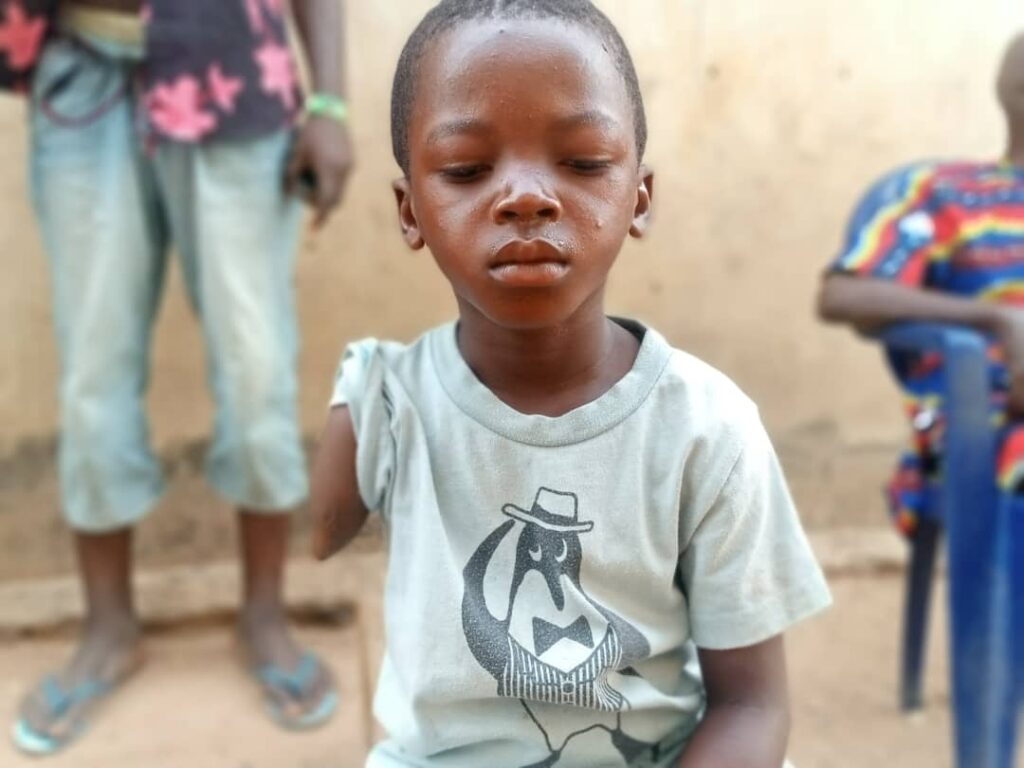
If Kingsley had sustained his injury just a few years earlier, Eucharia would have gotten enough money to take care of him.
“I used to be a successful farmer alongside my husband. We were earning enough to take care of the family but things went bad after the crises that got us displaced in 2018. My husband died two years ago. I am left to feed my children.”
Her situation is similar to that of Janet Ajir who currently looks after her 11-year-old child, Terlumun, who has a mental illness as well as speech impairment.
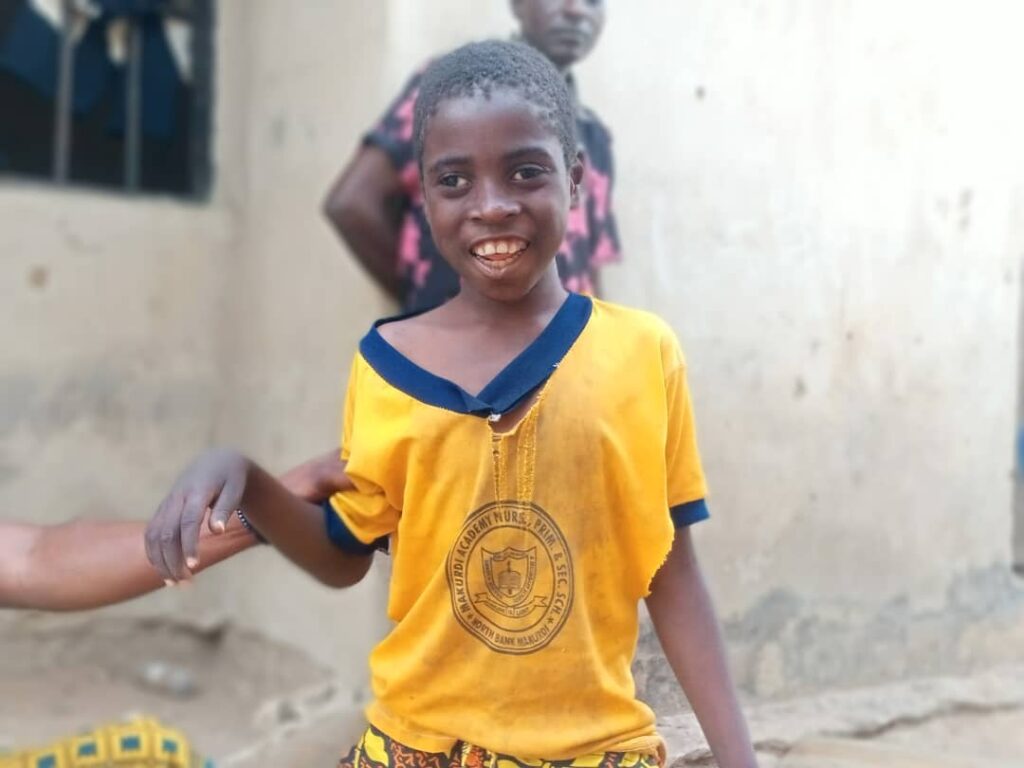
“I loved him as a child, I have five more children, He’s the sixth and the last born. Each time I passed, I heard people bristling at me. There are people who say my child is the worst thing in the community. The pain is like that of the moment I was in labour to deliver him. Seeing my child almost worthless is a thorn in my flesh. I hope there is something that can be done,” Janet said bitterly.
Msughter Koko, 12, is battling spina bifida, a birth defect that occurs when the spinal cord does not form properly. It’s a type of neural tube defect.
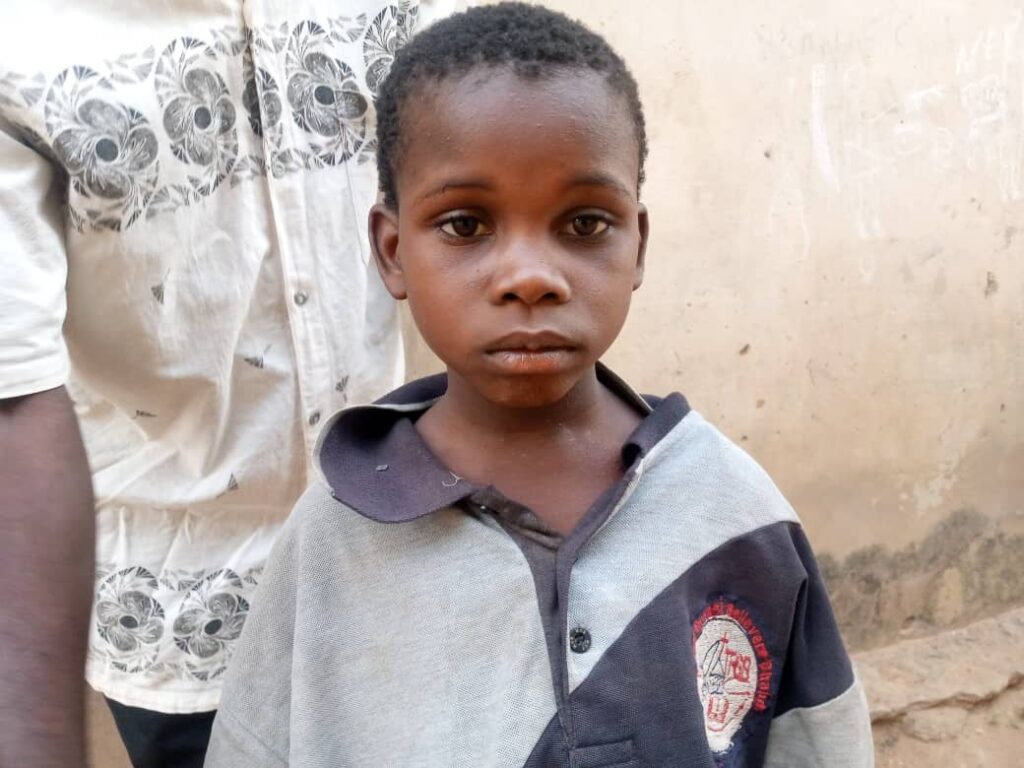
The condition makes him pass urine and excreta involuntarily. His father, Thomas Msughter, 56, said he does not have money to treat his son.
Speaking of his encounter with United Nations representatives, he said, “My joy was at its peak when UNICEF representatives came some time ago, promising to take care of my son. They later called that the Benue State Emergency Management Authority said our camp is illegal and that they would not be able to work with the camp anymore. That was how my hope of having my son treated was dashed.”
More painful stories
Sonter Terseer, 14, and Kumashe Terseer, 16 are siblings. The duo cannot speak as they live with speech and hearing impairment. Their grandfather, Jime Terseer, said he encountered challenges while running away from their troubled village, Ukaa in Guma LGA in 2018.
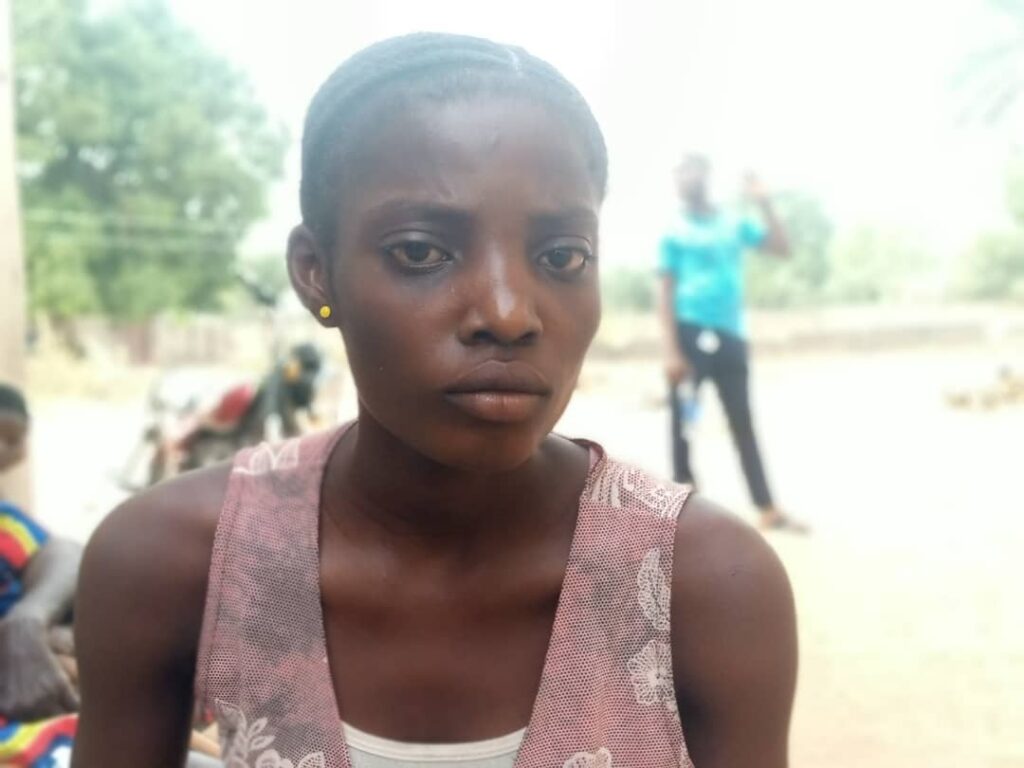
“That night was terrible for us. We weren’t very sure of the various angles the attackers were coming from. We were just running away. But then, my wife and I hand-held our grandchildren. They weren’t hearing nor could they speak.
“You will need to speak very loud before they will guess what you are saying and that may tell our attackers of our whereabouts, So, running or leaving them on their own was traumatic and we couldn’t allow that.”
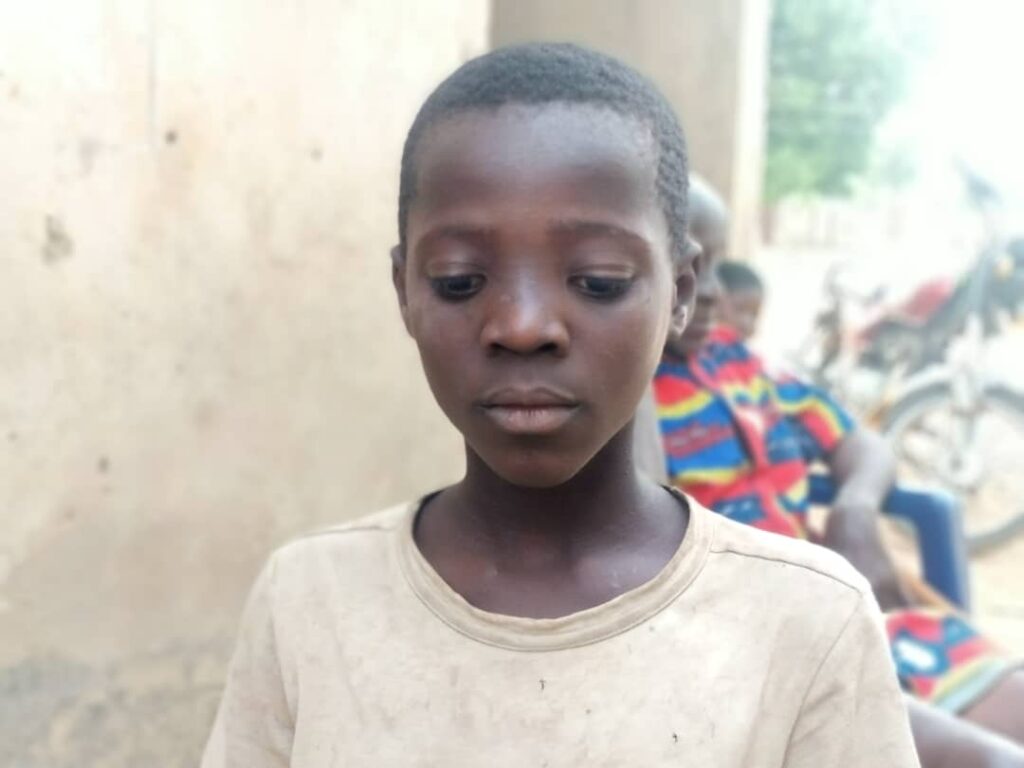
Many years after getting to the IDP camp, their problems remain. Reacting to this, the chairman of the IDP camp, Hul Ayabo, said he does “believe that any good thing could come to ameliorate the numerous plight of the disabled IDPs. There is a particular family in this camp that are all blind, all five siblings.”
Failed policy?
In 2021, the Nigerian government signed a revised edition of the National Policy on IDPs. The policy, which was first introduced in 2012, states that all wounded, infirm, and IDPs with a disability shall receive medical care to the extent practicable, which shall include psychological and social services whenever necessary.
They are also entitled to mobility devices such as wheelchairs, evacuating chairs, crutches, walkers, hearing aid equipment, among others.
“In the construction of camp infrastructure, provision should be made for entrance ramps, non-slippery floors, wide entrances/exits, and wide lavatories that can accommodate wheelchairs. Provision of these will aid their access to sleeping areas, conveniences, and dispensaries,” part of the policy read.
“Internally displaced persons with disability in need of specialised care should be provided with such, including caregivers to assist those with ambulatory problems or intellectual and developmental disabilities. Sign language interpreters are to be provided to aid communication with the deaf and physiotherapists, especially for those who have newly acquired disability (amputees) during the crises that displaced them.”
Even though the policy specified that children with disabilities should be enrolled in nearby special schools that meet their specific needs, affected children interviewed by HumAngle are neglected.
Reacting to this, Bem Ashe, chairman of the Joint National Association of Persons With Disabilities in Benue, said, “We can only vouch for the intervention coming from CSOs and NGOs. This, although limited, has been the only aid. I’ve tried to advocate for inclusiveness and quality representation. The current government is trying but not enough for the deformed persons.”
The decision of the Benue government through the State Emergency Management Agency, (SEMA) to proscribe some IDP camps has heightened the agony of those with disabilities. The government had claimed that camps like Tse Yandev and Nepal Quarters are illegal, alleging that residents in nearby communities pose as IDPs.
Several efforts to reach Benue’s SEMA Secretary, Emmanuel Shior, were unsuccessful. He did not respond to calls and text messages seeking clarification on the issue.
Support Our Journalism
There are millions of ordinary people affected by conflict in Africa whose stories are missing in the mainstream media. HumAngle is determined to tell those challenging and under-reported stories, hoping that the people impacted by these conflicts will find the safety and security they deserve.
To ensure that we continue to provide public service coverage, we have a small favour to ask you. We want you to be part of our journalistic endeavour by contributing a token to us.
Your donation will further promote a robust, free, and independent media.
Donate HereStay Closer To The Stories That Matter




